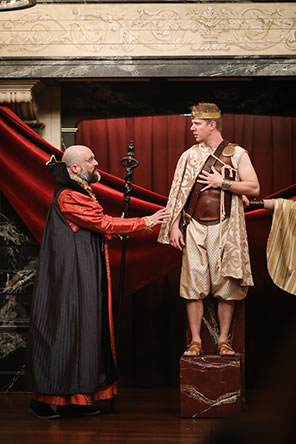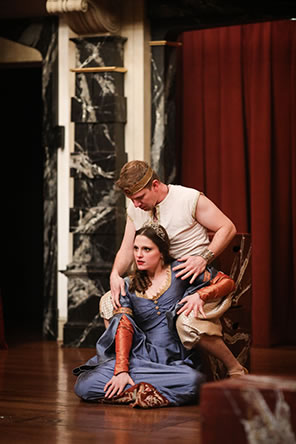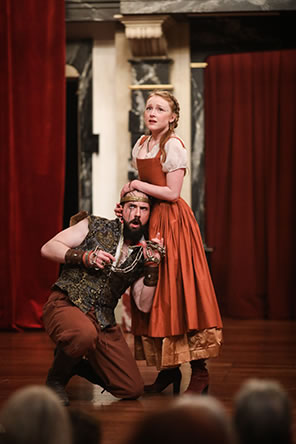A King and No King
Shakespeare Meets Arrested Development
By Francis Beaumont and John Fletcher
American Shakespeare Center, Blackfriars Playhouse, Staunton, Virginia
Friday, February 21, 2020, C–8&9 (center stalls)
Actors' Renaissance Season

King Arbaces (Benjamin Reed, right) receives counsel from Gobrias in the American Shakespeare Center's production of A King and No King at the Blackfriars Playhouse. Photo by Lindsey Walters, American Shakespeare Center.
Call this the reluctant review. Sarah and I are sitting in the lounge of the Stonewall Jackson Hotel in Staunton, Virginia. Through the window next to our marble tabletop we can see the American Shakespeare Center’s Blackfriars Playhouse next door, a hulking brick formation in the dark. We’ve just come from a show there and, as we usually do, settled into the hotel’s lounge for a glass of wine each. Normally, we relax, reflect, and converse about the show.
But here I am typing a review on my iPad. I’m not even waiting until morning to transcribe my notes. Not that I have a lot of notes, because I wasn’t intending to review tonight’s production of A King and No King, a 1611 play written by Francis Beaumont and John Fletcher. We’ve seen A King and No King before (Brave Spirits, 2017), and I loved it. Sarah slept through much of it, even as the action spilled out around us in the audience, a testament to how tired she was rather than a verdict on the play. I bring this up only because as I look across the table at my now dopey-eyed wife (we were up at 4:30 this morning), I revel in one of the night’s great pleasures, watching her watch this play with amusement and wonder at the comic performances, the 1611 script, and the brave choices (a euphemism, that) made by Beaumont and Fletcher, Reed and Speas, Davidson and Harrell, and the rest of the extraordinary talent that mounted this play.
The production is part of the company’s annual Actors’ Renaissance Season, in which a 12-member ensemble (plus three interns) mount a repertory of four plays (a total of 90 roles) without a director or production team, each play getting only 10 days of rehearsal. This Elizabethan-production-practice process has created some of my favorite theater moments over the years. However, I had particular reasons to pass on reviewing this production. Tonight was the first performance in front of an audience, a pay-what-you-will preview one week ahead of the formal opening. Such shows normally are off-limits for reviews. Furthermore, I’m in town to review two Shakespeare plays and conduct interviews for accompanying Dialogues; I can barely shoehorn those into my smooshed schedule, let alone add a third, non-Shakespeare review to my to-do queue.
Yet here I am, iPad on cocktail tabletop, hot wife opposite me with bedtime beckoning. Some productions and performances simply are worth scaling a mountaintop to proclaim their merits to the world: or, at least, Tweet your enthusiasm (which I did during the intermission—and then turned my phone off). The brilliance we’ve just experienced is in the play itself, in the actors’ individual and ensemble interpretation of the material, and in the performances, especially as this was a first outing for the cast, demonstrating how talented and tight an ensemble this is. Heck, I know I’m going to post this without production pictures, so check back here in a couple of weeks after the theater gets them to me. For now, just accept my words of wonder.
The words of Beaumont and Fletcher may be contemporaneous to Shakespeare’s, but they are as daringly contemporary to our time as the television comedy series Arrested Development. A King and No King centers on Arbaces (Benjamin Reed), the King of Iberia who is stricken with incestuous desire for his younger sister, Princess Panthea (Zoe Speas), who, um, kind of requites him. In an intertwining subplot, Arbaces bestows Panthea in marriage to Tigranes, the King of Armenia, whom Arbaces defeated in combat and now holds as prisoner, but Tigranes already is betrothed to the lady Spaconia—until Tigranes sees Panthea whose stunning beauty can turn a brother to lust, let alone a betrothed stranger. Meanwhile, the braggart coward Captain Bessus strives to maintain his valiant reputation against all odds, a reputation achieved when he tried to run away from a battle but, confused, ran into the enemy instead and, with his company following, turned the tide of the war.
This all may seem archaically weird, but with the lines delivered by actors well-versed in Jacobean playwrighting, a modern audience will think they are watching an off-kilter sitcom equal parts Veep, The Office, and The Big Bang Theory (where even the insider nerd lingo can be funny). The actors dress themselves in the style of a renaissance post-apocalyptic warrior society (with gowns on women and shirtless vests on men that showcase a troupe lust-worthy for all comers). Constance Swain and Meg Rodgers go totally bizarro as the two Gentlemen of the Sword, whom Bessus calls on to determine if he still can carry the label of “valiant” after a beating at the hands of one Lord Bacurius. Identified in the script as Gentleman 1 and Gentleman 2, they emerge like graphic versions of Thing I and Thing II, wearing black leotards, anatomically vivid codpieces, and foam swords from the Blackfriars lobby giftshop, and their tandem robotic line deliveries and gestures layer a Wes Anderson aesthete on these proceedings.
I used the Arrested Development analogy for Beaumont's and Fletcher's script in my review of the Brave Spirits production, too, and the Blackfriars cast expertly brings the honed comic readings of a Jason Bateman, Portia de Rossi, Will Arnett, Alia Shawkat, Michael Cera, Jeffrey Tambor, and Jessica Walter to that script:
- KP Powell as Captain Mardonius, Arbaces’s most trusted lord, serves as commentator/narrator in his plain-honest dialogues and asides. He reacts to the increasing craziness around the court with composed incredulity, at one point even pulling a leather bag of popcorn out of his vest to munch on as he watches the proceedings. In the climactic scene, Mardonius doesn’t have many lines, but Powell in the back corner says so much more with his reactionary expressions than anything Beaumont and Fletcher could put in his mouth.
- Zoe Speas as Panthea is ideally cast as the picture-perfect princess, playing innocent sweetness with an astute edge. Then, Speas, whose acting chops I’ve admired over the course of four seasons with the American Shakespeare Center (but performing in her first Ren Season), roars into dimensions I’ve never before seen from her as Panthea gives in to her own sibling lust. Speas goes all-out slut, growling her lines as she mounts a stage-set box and hungrily breathes in her brother’s guilt-laden admission of incestuous thoughts. “I feel a sin growing upon my blood, worse than all these, hotter than yours,” she moans after she happens to back into her brother’s crotch.
- Despite the swaggering (albeit misrepresented) nature of Captain Bessus, Chris Johnston plays him with disarming charm—except to the likes of Lord Bacurius (Brandon Carter), who easily disarms the coward captain. The role’s comedy isn’t only in the jokes but in his happenstance insertion into key points of the play’s plot, as when Mardonius refuses to act as Arbaces’s love envoy to Panthea. Bessus agrees to the job and, totally misunderstanding the king’s purposes, offers to perform a similar mission to the king’s mother. “My Mother!” Arbaces wails in repulsion. “Heaven forgive me to hear this, I am inspir'd with horror: now I hate thee worse than my sin,” he says to Johnston’s clueless Bessus.
- Ronald Román-Meléndez is a proud but sensible Tigranes, a warrior who perhaps lost to Arbaces in single combat by chance more than by skill. He seems as true of heart as he is stout of heart but can’t hold back the lust he feels upon seeing Panthea. He literally slides into courting her (at that moment she’s on her knees appealing to Arbacas) and right into a wonderful uh-oh moment, noting that Spaconia, the woman he’s really betrothed to and had maneuvered to get into Panthea’s company, is kneeling right behind Panthea. Román-Meléndez maintains Tigranes’s big heart even as he grapples with lust for one woman and love for another before learning how great it is to get lust and love in one woman.
- Tigranes's conversion in this production is due almost entirely to Sylvie Davidson’s portrayal of Spaconia. Brimming with lust for Tigranes, she yet recognizes that her man can’t help falling for Panthea, so Spaconia establishes an alliance with the princess beforehand. Panthea helps Spaconia get access to Tigranes, whereupon Arbacas, in one of his many rages misinterpreting events, orders that the two Armenians be imprisoned together. That allows Spaconia to unleash the full force of her love on Tigranes. “Alas, I have been too rugged, dear my lord,” she tells him at one point, and Román-Meléndez smiles contentedly.
- A latecomer to the Tigranes–Spaconia subplot is Lygones, Spaconia’s father and a counselor to Tigranes. Played by longtime Blackfriars and Ren Season vet John Harrell, the character is comic enough in the script as he discovers his daughter with Tigranes and thinks her merely the king’s courtesan. If the king were going to rob her status as a proper lady in Armenia, Lygones reasons, why didn’t she become a whore for the whole army and earn more money? Harrell, however, can’t resist a thematically apt visual pun in a play like this and wears a long, two-lumped money bag off his belt buckle that dangles pornographically down his crotch as he sits spread-legged on a stool.
- David Anthony Lewis plays Gobrias, Iberia’s lord protector, wearing a costume and makeup that recalls Ming the Merciless. He holds the keys to the kingdom and the mysteries that abound in the court, telling the audience in asides that his manipulations are coming to fruition—we just don't know what he's manipulating and why. So, what exactly is his relationship with the Queen Mother (Jessika D. Williams)? Is his pushing Arbaces and Panthea together just good counsel or is he really playing Pander, and for what purpose?


Top, Arbaces (Benjamin Reed) and his sister, Panthea (Zoe Speas), get uncomfortably close in the American Shakespeare Center's production of A King and No King. Above, Tigranes (Ronald Román-Meléndez) reunites in prison with his fiancée, Spaconia (Sylvie Davidson). Photos by Lindsey Walters, American Shakespeare Center.
Imaginatively insightful and singularly daring as these individual portrayals are, they all flow through Reed’s overarching portrayal of Arbacas. The king’s closest associate, Mardonius, describes him as “vain-glorious, and humble, and angry, and patient, and merry and dull, and joyful and sorrowful in extremity in an hour.” That exactly describes Reed’s comically bipolar king, innocently tyrannous and clumsily noble. “’Tis false,” Arcabas says when Gobrias first presents Panthea to him, the king having been away from home fighting Armenia so long that he refuses to believe this smoking-hot woman kneeling before him is his kid sister. “Is it?” the surprised Gobrias replies. “As hell, by Heaven, as false as hell,” Arbacas says, Reed playing this juxtaposition with smooth subtlety, using a slight catch after the oath by Heaven indicating he realizes he sounds silly but, not giving in a millimeter to any such suggestion, turns to a commanding tone to assert the line’s final phrase. When Arbacas is all-out bragging to excess and coaxing his people into idolatry, we still find him adorable. When the king is psychologically crippling himself with guilt over his incestuous thoughts, we want to encourage him to just go on and kiss the girl, sister or no sister. Such is Reed’s multidimensional ability to play a despot with empathy and a psychologically troubled soul with strength. This pays off most when the play hits its one structural rough patch as Beaumont and Fletcher drag out the reveal in a typically Jacobean manner. Reed has created such a fully conceived character that these passages become merely Arbaces being Arbaces.
This being the Ren Season with short rehearsal times, a prompter is placed just off stage. When actors forget their lines they call “prithee” for a prod. During this initial public performance, the cast issues many more prithees than normal. A couple of interchanges nearly disintegrate under the pressure of extensive line losses and misplaced speeches, and in the play’s centerpiece scene, as Arbaces broaches his sinful intentions with Mardonius, Bessus enters well before his time. Johnston’s clever, in-character recovery forces Reed to turn upstage for almost a minute before he can continue while, downstage, Powell waits patiently though not containing his own smile. In her preshow welcome address to the audience, Renea S. Brown (one of the interns, she plays various messengers and a dominatrix in the employ of Bacurius) describes the prompter-prithee protocol and how “we will continue as if nothing happened.” That’s true: once beyond the gaffe the actors quickly submerge back into their characters and re-envelope the audience in this fantasy world of Iberia.
But don’t believe all you see is playmaking chaos. As Bacurius forces Bessus’s Gentlemen of the Sword to disarm and accept their beatings, Rodgers gets her foam sword hilt caught in her codpiece. Yet another preview night miscue? Nope. It’s textual: “I beseech your Lordship stay a little, my strap's tied to my codpiece point,” Gentleman 1 says in Beaumont's and Fletcher's script. As Rodgers yanks off her foam sword the codpiece clatters across the stage. “Now when you please,” she says to Bacurius and bends over for a kick in the rear. This entire enterprise, beginning with the text and running through the actors' portrayals, embraces the conclusion Bessus and his two gentlemen swordsmen reach after their ceremonial beating at the hands and feet of Bacurius: “Let all the world come,” Bessus says; “we are valiant to ourselves, and there's an end.”
This is theater at its purest, an art form that can crash so many dimensions—spatial, temporal, psychological, emotional, sexual—in one 2 1/2- hour span. Bizarre, brazen, totally Jacobean, incredibly modern, A King and No King leaves audiences gasping in flabbergasted laughter, including Sarah. She’s tired now, though, and it is late. Time for bed, by Heaven.
Eric Minton
February 26, 2020
Thank You
Much appreciation goes to "a grateful Shakepeareances community member" who wants to remain anonymous for the kind financial support in Shakespeareances.com's coverage of the Actors' Renaissance Season at the Blackfriars Playhouse (the individual is not associated with the theater company).
Comment: e-mail editorial@shakespeareances.com
Start a discussion in the Bardroom



 Find additional Shakespeareances
Find additional Shakespeareances